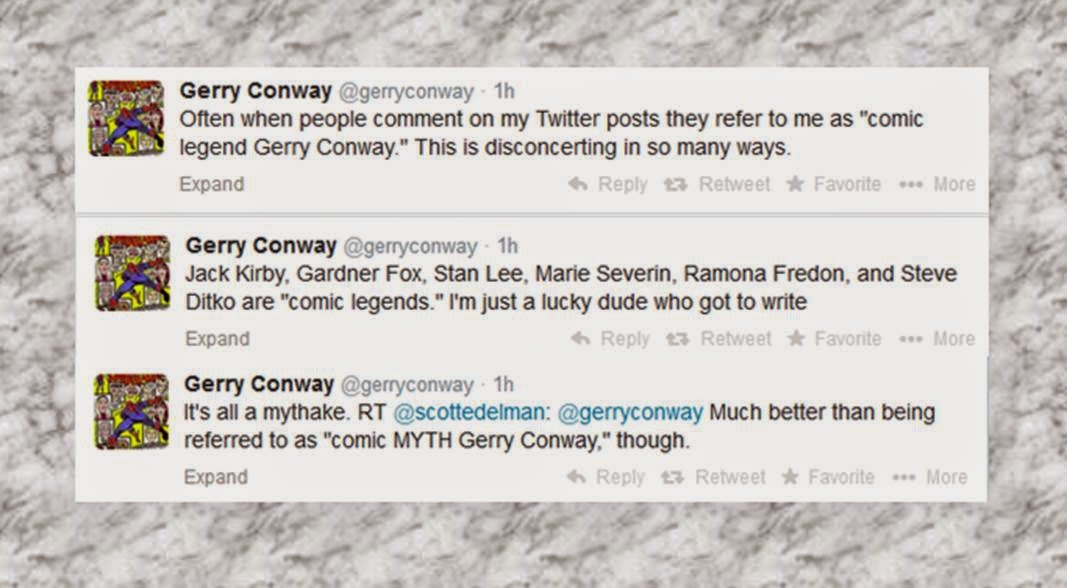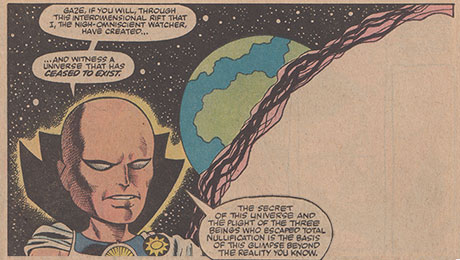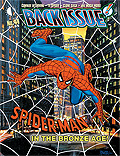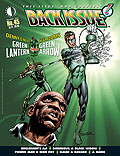 Doug: Two days ago, while perusing the BAB Twitter account's timeline (I have two accounts/timelines -- one for "me", and one for "us" that I share with my partner), I came across a series of tweets from Bronze Age scribe Gerry Conway. I'll admit to being tired of Conway often being referred to as "the guy who killed Gwen Stacy". While that may be a claim to fame of his (or infamy, depending on your perspective, I guess), it's certainly in no way indicative or summative of the body of his work in the industry. Conway was lamenting the fact that he's often referred to as a "comics legend", and took just a smidgeon of umbrage. He deflected the "legend" status to folks like Stan Lee, Jack Kirby, and Steve Ditko. So of course, I meditated on that for awhile and thought to myself, hey -- we need to discuss this on the blog!
Doug: Two days ago, while perusing the BAB Twitter account's timeline (I have two accounts/timelines -- one for "me", and one for "us" that I share with my partner), I came across a series of tweets from Bronze Age scribe Gerry Conway. I'll admit to being tired of Conway often being referred to as "the guy who killed Gwen Stacy". While that may be a claim to fame of his (or infamy, depending on your perspective, I guess), it's certainly in no way indicative or summative of the body of his work in the industry. Conway was lamenting the fact that he's often referred to as a "comics legend", and took just a smidgeon of umbrage. He deflected the "legend" status to folks like Stan Lee, Jack Kirby, and Steve Ditko. So of course, I meditated on that for awhile and thought to myself, hey -- we need to discuss this on the blog!Doug: Gerry Conway wrote a memorable run on Amazing Spider-Man, following an incredible run of 106 out of the first 110 issues written by Stan "the Man" Lee (with issue #s 101-104 penned by Roy Thomas). Conway stayed on the title for over three years; the deaths of Gwen Stacy and the Green Goblin came inside his first 12 issues. As Jim Shooter before him, Conway cut his professional teeth as a teenager.
He crafted that story -- perhaps the most pivotal 2-issue "arc" of the Bronze Age, and also co-created the Punisher as well as several Bronze Age villains that have become Spider-Man mainstays. He wrote the controversial clone saga (which looks like a literary classic in its own right as compared to the second clone saga) and brought a sort of second closure to the death of Gwen Stacy. Additionally at Marvel, he co-created Werewolf by Night and Man-Thing, and wrote the premier issue of Tomb of Dracula. Click here for a listing of Conway's creations/co-creations during his prolific career at Marvel and at DC.
Doug: So -- what exactly is a legend, then? If we look at the parameters of this blog, which most of us agree generally (but not always) focuses on the period from 1970-85, then I'm going to stand up and say that Gerry Conway is a Bronze Age legend. His Spidey run, coupled with his eight years as scribe of Justice League of America, is enough to get brought up in the conversation. My next question would be -- additionally, who else is a "legend"? I know that I often use the term "master" in describing the art of John Buscema, Neal Adams, Kirby, and sometimes even John Byrne. Are they legends (Kirby undeniably is, so no one needs to go there), too? Is Julius Schwartz, the shepherd of the Bronze Age as an editor, a legend? I'll be curious to see what our masses have to say about this oft-bandied term. And when today is all said and done, Gerry Conway may just have to wear that crown...
 |
| http://www.imdb.com/name/nm0176689/ |



















































19 comments:
Legend or not, he was one of the best writers during the Bronze Age. That makes him one of the best of all time in my book.
Well, I guess the question is.., 'Who exactly makes comic book legends..?'
1) The readers who grew up with their cleverly-written or drawn exploits, warmed by their insight and oft-riveting imagination-capturing ideas.
2) The stories that resonate to our core about the characters we grew to love, making them come alive.
I'd call Mr Conway a legend on so many fronts, with many layers. I find his earlier ASM issues (I'm referring especially to 121-138 here..) among the best Spiderman stories ever.
I've never been a fan of Gwen coming back, but that was Lee unwisely bowing to reader pressure. Conway brought a layer of warmth to Peter Parker's life in those panels, that later writers have only tried to mimic.
He truely had the voice of Peter Parker and his world.
He just published a scathing appraisal of Amazon's purchase of Comixology and their subsequent changes to it - showing he still stays on top of the industry, even if I couldn't tell you what was the last thing he wrote.
You can read it here (warning: it is long!).
Anyway, I'd say he counts as a "legend," whatever that means.
I appreciate the comments so far.
But we've not really delved into exactly what makes people consider a creator as having "legendary" status. Is it a specific body of work? Is it more general? Is it longevity alone? For example, and I'm not picking on him, Don Heck had a very long career in comics and was instrumental in the formative years of several of Marvel's burgeoning Silver Age books. So he has longevity and is attached to some important works. But even among his fans I don't know that I've heard him spoken of as a "legend".
I'd like to get a nice 40-comment discussion going here today. Don't hold back...
Doug
Yeah, David makes a good point about what constitutes a legend. I certainly agree with Conway on all of the creators he mentions, and would add Will Eisner, Joe Simon, Joe Kubert, John Buscema, Steranko and Neal Adams. Also, some of the EC alumni like Wally Wood and Harvey Kurtzman, as well as Jack Cole and Matt Baker.
I'd consider Conway a legend because:
a) he started writing comics when he was a friggin' teenager!
b) his tenure on Spider-man had some real resonant moments, and like David said, he really had a good handle on the character.
Here's a few others I'd consider legends:
Roy Thomas - for slowly and smoothly assuming many of the writing chores at Marvel in the 1960s, and following in Lee's footsteps in expanding the mythology of the shared Marvel Universe, for his long and memorable tenure as the main Conan writer, and for just being an all-around great writer and editor at both Marvel and DC.
Chris Claremont - for that initial run on X-men, which had so many story arcs that are still read and referenced by comics fans to this day.
John Byrne - for participating in part of those X-men glory days with Claremont, for then taking over Fantastic Four and revitalizing the title, and then for participating in the Superman revamp. Also, he was for quite some time one of the most highly regarded and influential artists in the industry.
Jim Starlin - for his initial work on Warlock and Captain Marvel alone, to say nothing of everything else he's done.
Alan Moore - don't really think this needs explaining.
Frank Miller - again, doesn't need explaining, although personally I'm not the biggest fan of his legacy.
And perhaps more controversially, because he's quite reviled in some circles, Jim Shooter, because:
a) he started writing professionally for comics when was in his friggin' early teens!
b) started a pretty successful tenure as Marvel's EIC when he was in his late 20s.
c) he wrote some pretty damn good and well-regarded stories when he put his mind to it.
Yes -- David's remark about "the stories that resonate to our core" was solid, and perhaps I didn't give that enough weight in my previous comment.
Thanks Edo -- quite thorough!
Did anyone feel like evaluating Julie Schwartz as an editor? Personally, I'd say "yes", and I'd probably even say Mort Weisinger... keeping in mind that not all legends are viewed popularly.
Doug
Doug, personally, I think both Schwartz and Weisinger are industry legends. And yes, with regard to Weisinger, I agree that he had a legendary impact even though he's not necessarily perceived positively or universally liked - that's kind of the point I was trying to make (poorly) when I brought up Shooter.
I don't think all comics legends are necessarily positive - sometimes they are legendary due to their infamy. I mean, heck - Frederic Wertham had a HUGE influence on comics - and he never wrote one. I'd say he was a legend.
Or, William Marston - he may not have had longevity, but his creation of Wonder Woman and his outside of the box views make him a legend in my eyes.
Steve Gerber is another one I would say is legendary - not only for his work, but for his battles with Marvel - and for his bizarre approach.
The make-up of "legends" is arguable, I guess - but I would go with the easiest definition - if we can tell "legendary" tales about them they are legends.
Which I guess means that by that definition even people I despise like Todd McFarlane and Rob Liefeld are legends - and heck, for taking the ball home and founding Image comics alone they deserve that designation.
I think it's easier to spot a "legend" in hindsight; today's fan favourite is tomorrow's legend. Enough time has passed that people who were active (and popular AND talented) in the 70s and 80s can now be considered for "legend" status.
It's the same for other forms of entertainment or sports; in the 70s Babe Ruth and Ted Williams were already legends, Clemente and Aaron had just become legends, and guys like Bench, Ryan, Rose, Kingman, etc. were on their way to becoming legends. So guys like Roy Thomas, Conway, Wolfman, Englehart, Starlin, Claremont et al. are now making their way into that "legend" class.
Mike W.
Mike W's got the best point, it's definitely the passage of time.
But personal insight is always key in the mix of things, isn't it..?
Besides my personal 'active collecting years' ('73-76), reading books like 'Untold Stories' and other vintage articles (like that Creem cover story on Marvel's Bullpen, circa 1972..) provided folks a keen view of how loose and free-flowing Marvel did things in the early '70s when/where the 'magic' happened, and that will provide some rose-tinted glasses for our subjective favoritism towards certain industry 'movers and shakers'. Somehow the 'looser Bullpen' made for some enormously entertaining characters, potential plotlines mulled over, folks like Gerber and Englehart having further creative reins, than someone like Shooter perhaps would have allowed a decade later. That's either 1) editorial permissiveness (personalities of who's in charge..), or 2) financial overhanging burdens (to get the 'trains running on time') and making deadlines, or 3) just a sign of the times (as the late '70s/early '80s showed..), to be filed under 'stuff happens'.
Great points. This is becoming slightly academic, as I hoped it would.
So personal satisfaction is certainly part of the equation. I'm still stuck, though, on guys like Heck and Tuska. Huge bodies of work, longevity, both involved in some eras of my comics-reading of which I have fond memories. Yet, not in the same category as Conway, either Buscema, Adams, etc. Shoot -- I would not characterize myself as a Gerber fan, but I wouldn't balk at all of his status as a legendary writer. Hmmm...
Doug
This is going to sound curmudgeonly, I know, but I'm going to toss in the thought that, if an individual's status of being Legendary (or not) prompts much lively debate, then it seems pretty likely that said status maybe shouldn't be confered. Y'know what I mean? It sort of cheapens what the word should represent, in my mind.
Creators with unique vision and talent that leave an indelible, eternal mark on the industry- w/out being highly derivative of others' works-- that strikes me as pretty key. And whose names loom large in conversation and broadly recognized across fandom and the industry.
Now, if we were talking about something more like a Hall of Fame. . .
HB
HB --
So not all Hall-of-Famers are legends?
While I agree that today's conversation is quite subjective, I think there's plenty of room for our readers to say what the term/notion means to them, and who personally they feel fits the bill.
Doug
To me the 'legendary' label really boils down to, as David_b said, whether or not the writer/artist's work resonates to your core. If a large number of people were moved by a person's work then that person should be called a legend.
I also agree with Mike W when he say a legend is measured by how his work stands up to the test of time.
- Mike 'legendary appetite' from Trinidad & Tobago.
As a kid who really only started seriously collecting a few months into Conway's run on Spider-Man and just a bit before he took over the FF and who regarded those as my favorite titles at the time, I'd have to say that I mostly enjoyed Conway's writing, but I think he falls a bit short of being a genuine legend, but that label is a bit subjective. At least I wouldn't consider Conway a legend of the same ranking as Kirby, Ditko, Lee, Eisner, Kurtzman, Wood, or even Roy Thomas, Steve Gerber, Alan Moore, Miller & Morrison, to name a few more relatively recent ones who IMO were all pretty innovative storytellers and helped shape the medium. Of course, I know some people would rank Conway as a better writer than some or all of those I listed. At the least, though, Conway earned legendary status for penning two of the most controversial stories of the 1973 -- not only the death of Gwen Stacy, but also the lobotomozing of Franklin Richards by his own dad (albeit to save the world!), although Conway rectified that situation before taking off within the next year -- imagine how much more Conway would be hated if he'd left the FF baby a braindead husk!
I'd only hang the "legend" tag on a few comic book folks. To be a "legend" it becomes not so much about your actual comic book work, but about its relative impact on a certain audience. I'd use Jim Steranko, a guy who once upon came close to the legend title, but who did remarkably little work.
Kirby for sure. Lee certainly. I'd even give a nod to Eisner and Cole. But it gets thin quickly. Wally Wood too, but that goes hand in hand with his life and death. Ditko too, but his odd philosophy feeds that storyline.
Guys can be popular and can be "stars" even. Buscema was a master draftsman, but he didn't "create" all that much stuff really, save for the day-to-day material it requires to tell a damn good story.
Al Fieldstein has just passed away and despite a massive impact on the field with his editorship of MAD, he's not a legend. Harvey Kurtzman might be and he did relatively much less overall. It's not about how much you work, it's about how that resonates and elevates above the work itself, something creators can't really control themselves.
And for the record, Gerry Conway was the Bronze Age workhorse writer, the heir to Joe Gill and other scribes who hit the marks month in and month out. That's highly admirable in my book.
Rip Off
First, happy Mayday everyone! Hope all of our non-US readers are enjoying their day off (I'll being doing yard work...)
As to the topic at hand, I'm glad a few others here mentioned Gerber. Since he's one of my favorite writers, I didn't mention him in my first post because I wanted to seem "objective." Same reason I avoided mentioning Don McGregor, although I will say I think his work on Black Panther and Killraven runs in the 1970s are legendary.
It also seems that Roger Stern, who penned so many outstanding stories, is finally getting his due among fandom - if not a legend, he's definitely considered one of the masters of the craft.
Doug, good observation about Heck and Trimpe; yes, despite the immense body of work they produced, I really don't think they can be put in the "legend" category. And it's not really a knock at either: I would also say two of my very favorite artists, Sal Buscema and Joe Staton, probably can't really be considered legends, not in the way someone with a much smaller body of work, like Howard Chaykin, can be. I think it's not just a matter of creating well-regarded and memorable stories and/or art, but also establishing innovative new storytelling styles and the resulting influence on other creators. That's part of it, anyway.
And HB, by your exacting standard, there aren't many undisputed legends at all in the comics field. Take the example of Stan Lee: just go to the message boards at Marvel Masterworks or Bleeding Cool and start a thread on "comics legend Stan Lee" and see how long it takes for the comments calling him a "talentless hack" and "overrated blowhard", etc. start rolling in. I'd give it a few minutes, tops. And I've seen the same thing happen - albeit with lesser vehemence - on discussions about other icons, like Neal Adams, Alan Moore, and even Jack Kirby.
Yyyyeah, maybe my criteria are too stringent-- I might be hardened by a tendency for media, advertising, and pop culture to toss the word "legendary" around all-too-easily. . . turning it into tired puffery, perhaps, rather than it being a legitimate label.
It may sound subjective and a bit silly, but a "legendary" figure to me is someone whose name evokes a (mental, at least) response like Randolph Scott's does in BLAZING SADDLES. . .
HB
Well, Conway is a personal favorite of mine because I cut my comic book teeth on his AMAZING SPIDER-MAN - Issues #121-122 were some of the first comic books I ever read and it immediately sucked me and made me want to keep reading future issues and finding back issues to find out what led up to these monumental events - as well as his lengthy run on JUSTICE LEAGUE OF AMERICA which for me is the *definitive* JLA.
I think part of the difficulty in bestowing legendary status on Conway is that - like most Bronze Age writers - what Conway was particularly good at was building from the raw material and foundation laid down by the undisputed Legends (Lee and Kirby, Gardner Fox, Julie Schwartz, etc.) and digging deeper and adding layers and more sophisticated characterization.
Conway and others such as Englehart, Miller, Byrne, Claremont, Wein, Wolfman basically deepened and extended the characters as well as their major adversaries, creating backstories and retcons filling in their past that helped give them more depth.
That's why I think few Bronze Age writers really feel like they get (or deserve in Conway's case) the status of legendary. They are perceived as "simply" standing on the shoulders of giants.
Just my 2 cents.
Post a Comment